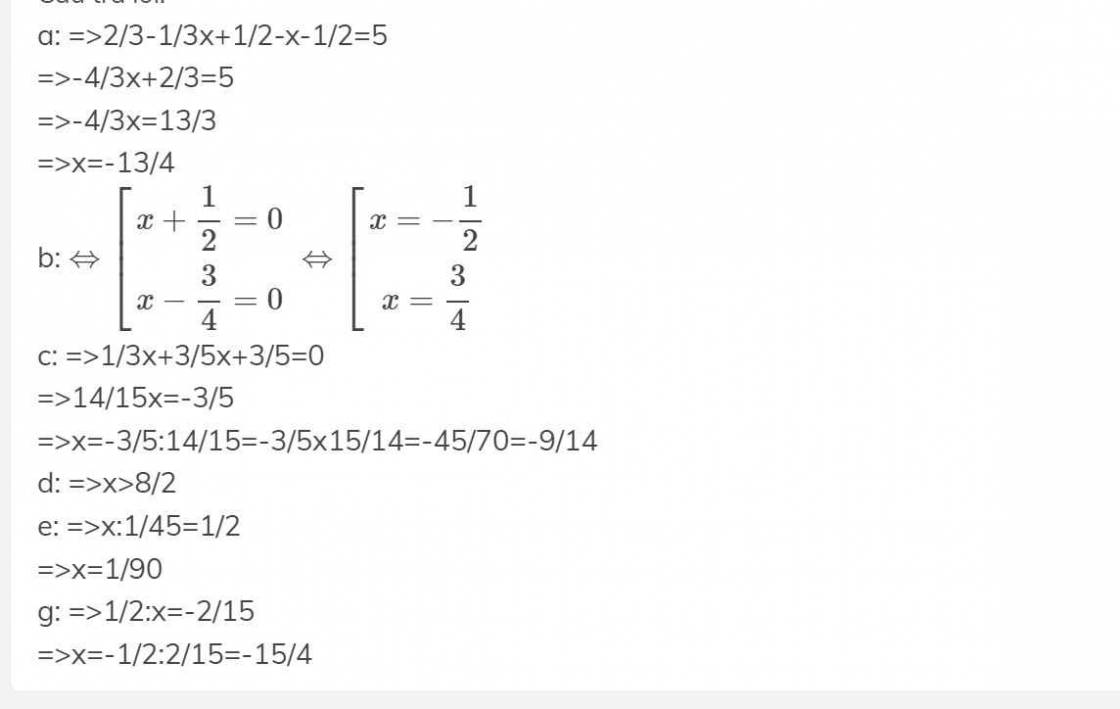
Hãy nhập câu hỏi của bạn vào đây, nếu là tài khoản VIP, bạn sẽ được ưu tiên trả lời.


c: Ta có: \(\left(x+1\right)^2\ge0\forall x\)
\(\left(y-\dfrac{1}{3}\right)^2\ge0\forall y\)
Do đó: \(\left(x+1\right)^2+\left(y-\dfrac{1}{3}\right)^2\ge0\forall x,y\)
\(\Leftrightarrow\left(x+1\right)^2+\left(y-\dfrac{1}{3}\right)^2-10\ge-10\forall x,y\)
Dấu '=' xảy ra khi x=-1 và \(y=\dfrac{1}{3}\)

x:2=y:3->x/2=y/3
Áp dụng tính chất dãy tỉ số bằng nhau,ta có:
x/2=y/3=x+y/2+3=10/5=2
từ: x/2=2->x=2.2=4
y/3=2->y=2.3=6
vậy...
\(\dfrac{x}{2}=\dfrac{y}{3}\Rightarrow\dfrac{x}{2}=\dfrac{y}{3}=\dfrac{x+y}{2+3}=\dfrac{10}{5}=2\) (theo tính chất củadãy tỉ số bằng nhau)
\(\Rightarrow x=4,y=6\)

\(4^x=32^{10}\)
\(\Rightarrow2^{2x}=2^{50}\)
\(\Rightarrow2x=50\Rightarrow x=25\)

Bài 1:
a) \(-5\left(x^2-3x+1\right)+x\left(1+5x\right)=x-2\)
\(\Rightarrow-5x^2+15x-5+x+5x^2=x-2\)
\(\Rightarrow16x-5=x-2\)
\(\Rightarrow16x-x=5-2\)
\(\Rightarrow15x=3\)
\(\Rightarrow x=\dfrac{15}{3}=5\)
b) \(12x^2-4x\left(3x+5\right)=10x-17\)
\(\Rightarrow12x^2-12x^2-20x=10x-17\)
\(\Rightarrow-20x=10x-17\)
\(\Rightarrow-20x-10x=-17\)
\(\Rightarrow-30x=-17\)
\(\Rightarrow x=\dfrac{-30}{-17}=\dfrac{30}{17}\)
c) \(-4x\left(x-5\right)+7x\left(x-4\right)-3x^2=12\)
\(\Rightarrow-4x^2+20x+7x^2-28x-3x^2=12\)
\(\Rightarrow-8x=12\)
\(\Rightarrow x=\dfrac{12}{-8}=-\dfrac{4}{3}\)
Bài 2:
a) \(\left(x+5\right)\left(x-7\right)-7x\left(x-3\right)\)
\(=x^2-7x+5x-35-7x^2+21x\)
\(=-6x^2+19x-35\)
b) \(x\left(x^2-x-2\right)-\left(x-5\right)\left(x+1\right)\)
\(=x^3-x^2-2x-x^2+x-5x-5\)
\(=x^3-2x^2-6x-5\)
c) \(\left(x-5\right)\left(x-7\right)-\left(x+4\right)\left(x-3\right)\)
\(=x^2-7x-5x+35-x^2-3x+4x-12\)
\(=11x+23\)
d) \(\left(x-1\right)\left(x-2\right)-\left(x+5\right)\left(x+2\right)\)
\(=x^2-2x-x+2-x^2+2x+5x+10\)
\(=4x+12\)

Bạn nên viết lại đề bài cho sáng sủa, rõ ràng để người đọc dễ hiểu hơn.
f: =>4(x^2+4x-5)-x^2-7x-10=3(x^2+x-2)
=>4x^2+16x-20-x^2-7x-10-3x^2-3x+6=0
=>6x-24=0
=>x=4
e: =>8x+16-5x^2-10x+4(x^2-x-2)=4-x^2
=>-5x^2-2x+16+4x^2-4x-8=4-x^2
=>-6x+8=4
=>-6x=-4
=>x=2/3
d: =>2x^2+3x^2-3=5x^2+5x
=>5x=-3
=>x=-3/5
b: =>2x^2-8x+3x-12+x^2-7x+10=3x^2-12x-5x+20
=>-12x-2=-17x+20
=>5x=22
=>x=22/5

a: Ta có: \(\dfrac{x+2}{5}=\dfrac{1}{x-2}\)
\(\Leftrightarrow x^2-4=5\)
\(\Leftrightarrow x^2=9\)
hay \(x\in\left\{3;-3\right\}\)
b: Ta có: \(\dfrac{x}{x+1}=\dfrac{x+5}{x+7}\)
\(\Leftrightarrow x^2+6x+5=x^2+7x\)
\(\Leftrightarrow6x-7x=-5\)
hay x=5
c: Ta có: \(\dfrac{x-1}{x+2}=\dfrac{x-2}{x+3}\)
\(\Leftrightarrow x^2+2x-3=x^2-4\)
\(\Leftrightarrow2x=-1\)
hay \(x=-\dfrac{1}{2}\)

a: =>2/3-1/3x+1/2-x-1/2=5
=>-4/3x+2/3=5
=>-4/3x=13/3
=>x=-13/4
b: \(\Leftrightarrow\left[{}\begin{matrix}x+\dfrac{1}{2}=0\\x-\dfrac{3}{4}=0\end{matrix}\right.\Leftrightarrow\left[{}\begin{matrix}x=-\dfrac{1}{2}\\x=\dfrac{3}{4}\end{matrix}\right.\)
c: =>1/3x+3/5x+3/5=0
=>14/15x=-3/5
=>x=-3/5:14/15=-3/5x15/14=-45/70=-9/14
d: =>x>8/2
e: =>x:1/45=1/2
=>x=1/90
g: =>1/2:x=-2/15
=>x=-1/2:2/15=-15/4

\(2\left(x-1\right)-5\left(x+2\right)=-10\\ \Rightarrow2x-2-5x-10=-10\\ \Rightarrow-3x=2\\ \Rightarrow x=\dfrac{-2}{3}\)
Vậy \(x=\dfrac{-2}{3}\)